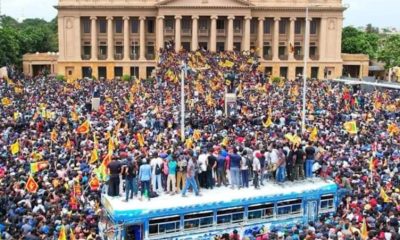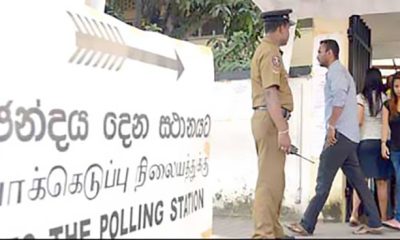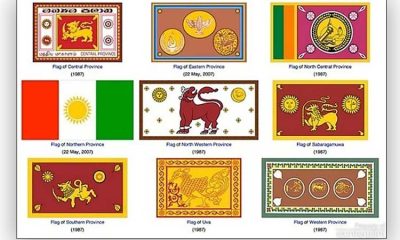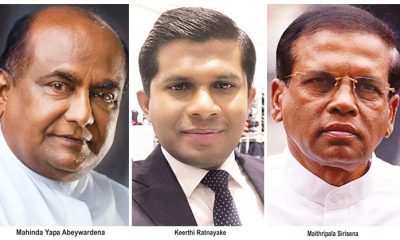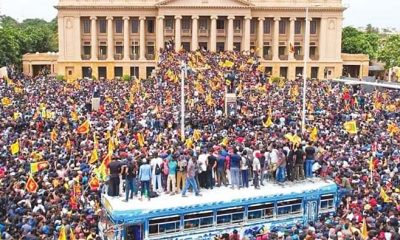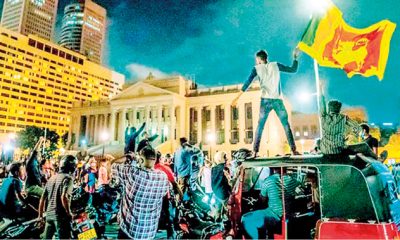Opinion
Change is good: Provided it is for better and not for worse

by Jayasri Priyalal
Many Sri Lankans may have joined in commemorating the 2568 years of Buddha Parinirvana with much discourse about the fundamental truth, the core teaching of Buddhism about impermanence, last week. As we all realise the fact, that there is nothing permanent in this world; everything is subject to change. Change is the only permanent constant in the universe. This essay focuses on change from socio, political and economic angle.
Sri Lanka is undergoing its worst ever economic crisis without any hope of getting it into a recovery track soon. There is a clarion call from the masses aspiring for a system change as a springboard towards chalking out a recovery path to overcome the crisis. Yet, no one knows or discusses what that system should be to put in place.
One fact remains as an acceptable analogy. Those who cannot cope with change will never be able to initiate change in any circumstances. This applies to all stakeholders including those who caused and contributed to the current crisis. Fair share of responsibilities falls on the electorate who got carried away with populism engineered by a few; with an ultimate aim of state and regulatory capture for their advantage leaving the country into a dire state grappling with debt. Therefore, capacity and capability to initiate that essential change is absent in the DNA of politicians who deceived their constituents.
This year 2024, is remarkable for those countries where representative democracy functions. Over 2 billion voters are expected to cast their votes at polls. As per predictions in 70% of the elections a change in government is anticipated. Some elections are already over and results are known. In Sri Lanka there are two main elections in the pipeline namely the Presidential and parliamentary polls. The UK gets ready for polls on 4th July 2024. Change is the campaign theme of the Labour Party led by Sir. Keir Starmer. Chase or change dilemma will be an option for the electorate in the USA to test in upcoming presidential elections in November 2024.
Change and the Chase Countercyclical in Sri Lanka
In the last presidential election in 2019 Sri Lankan electorate rallied with President Gotabaya Rajapaksa giving him an absolute mandate with 6.9 million votes, anticipating a change for the better. It was too late for Sri Lankans to realise that their bet was on the wrong horse. That change triggered the public to rally towards a chase. People’s power proved greater than those who come and hold political power.
The so-called people’s movement Aragalaya forced the Prime Minister to resign with the ipso facto resignation of the cabinet of ministers. Amongst many wrong doings President Gotabaya Rajapaksa nominated an unelected PM to lead the cabinet without dissolving the parliament with the reluctance to test the pulse of the people to secure the right mandate to govern. Rest is history, and finally the people’s power chased out President Gotabya Rajapaksa culminating the grand achievement of the GoHomeGota campaign. Thereafter, people’s aspiration and hope for a change short lived and shortchanged, widening the mistrust between policy makers and electorate further.
Have we learnt from similar power struggles from the past?
Our present has direct links in many ways to the past. The island nation has been deceived by many egocentric figureheads -as they cannot be named as true patriotic leaders- misjudged the public sentiments and aspirations and surrendered the sovereignty of the country to Colonial Masters. Does history repeat itself? Have we forgotten the bitter lessons learnt from history is what is discussed in the next few paragraphs?
This writer is enthusiastically influenced by the historical knowledge shared by Prof. Raj Somadeva via Neth FM radio and the YouTube programme. Due credit should be given to the Professor for all his extensive historical studies and the efforts to share them with the rest of the Sri Lankans in and outside the country. Prof. Somadeva narrates the stories very well with an appeal to draw parallels to the contemporary political power struggles with a warning not to repeat the past mistakes.
Coronation of Sri Wickrama Rajasinghe, last King of Kandyan Kingdom 1798
Having defeated the British Army battalion sent by the Governor Frederick North badly in 1803, the powerful Kandyan Kingdom fell to the British by 1815. Internal power struggles between the Kandyan elites to capture the throne from the Nayakkar clan paved the way for colonials to step in effortlessly to end the 2300 of historical royal lineage, to govern. Finally, Ceylon became a colony of the British Empire under King Gorge III.
Maha Adikaram Pilimatalawe engineered the coronation of Kannasamy Naidu a nephew of Sri Rajadhi Rajasinghe over the legitimate claimant to the throne Muttusamy. Pilimatalawwe was ambitious of becoming the Kandyan King, worked closely with the British and installed Kannasamy in the throne assuming he can control the King to meet his egoistic goals.
The change he anticipated never happened. Then he conspired to kill the King. Pilimatalawwe and the conspiring gang were beheaded by the King. Pilimatalawwe engineered the change and had to work on a chase and he got eliminated by the person whom he elevated to power.
Power crazy Maha Adikaram installed a weaker character in the throne so that he could overthrow him with the help of the British. The whole strategy backfired ultimately sacrificing the nation on a platter to the British ending a royal lineage of over two millennia. The miscalculations of those close to political power to serve their selfish needs have ruined many countries bringing in misery, hardship and colossal loss of lives and property to its citizens. The island nation has many such cases throughout its history.
Putting a Wrong Guy in a Critical Position – Are we repeating the same mistake?
Throughout history we Sri Lankans have repeated the same mistake and disrupted the nation’s progress leaving the plight in the hands of outsiders. Although there aren’t any competing empires in the current context, there are clear indications that the local political expectations are gravitating towards the emerging geo-economic-political centres.
The current political leadership or the conventional thought processes are not spurred with an organic strategic growth trajectory with originality backed thought process. None of the political parties have identified the right causes that led to the current crisis.
Moreover, they are getting ready to deceive the electorate to secure the mandate to govern to continue to repeat ill-conceived policy tools without coming up with viable policy options to break the vicious debt trap. Adage goes on to remind that – right diagnosis is half of the solution. Instead, many are getting ready to prescribe the failed remedies with a strong dosage as prescribed by the defunct cold war institutions. It appears that the healer itself is the disease leaving the patient bewildered and leaving the disease into an uncontrolled debt pandemic. We Sri Lankans need to think locally and act globally and not the other way around. In the absence of original ideas and remedies, local politicians are happy to swallow the bitter medicines prescribed on the basis of diagnoses.
Since Independence the ideology of various political parties were developed based on systems and discourses practiced in other countries introducing a welfarist socio economic system. Now, it has turned towards the aspirations of the emerging geo-economic centres. Sri Lankans need to forge a unique turnaround strategy to serve the best interest of its people, and not to become subjects of other countries. Therefore, the Sri Lankan electorate needs to collate its political mandate in the hands of a leadership who will change the destiny of the country for the better and not for the worst.
Prisoner’s Dilemma
Colonial masters connived with the power crazy Kandyan elites and captured the last King of Ceylon, Sri Wickrama Rajasinghe, dethroned, imprisoned and deported to India. Once you fast track the historical events, we can extrapolate the current situation drawing many parallels. Unlike in the past, the leaders who mislead and mismanage the future of the nation without any original thinking and being subservient to foreign advice will never be deported. They will be facing a prisoner’s dilemma remaining on the island, having given away ports, harbours, airports and other critical infrastructure to foreigners to manage and own.
Opinion
A reflection on discipline and perspective

Crime and Punishment are perennial, vexed, debatable matters that can aptly be applied to the current controversy on the appropriateness of corporal punishment by schoolteachers.
Much publicity has recently been generated by an alleged corporal punishment by a teacher in Royal College. In the midst of all this, we must also consider the ripple effect such public scrutiny may have on other teachers. Many might now hesitate to correct or discipline a student out of fear of being misunderstood or publicly shamed.
A possible likely outcome is that a growing number of teachers may simply choose to limit themselves to merely textbook teaching – doing only what is required of them and nothing more. But if most teachers take a step back, fearing a backlash, what happens to discipline? What happens to the values, the life lessons and the personal growth that come from being held accountable? We risk creating a system where young students grow up without boundaries, without guidance, and ultimately, without the character that true education is meant to build.
The Royal matter
Much has been said over the recent incident involving a teacher at Royal College, which has now gone viral on social media. This is now in the hands of the Child Protection Authority, and naturally, emotions are running high.
Let me start by saying categorically that I do not condone violence or abuse in any form. If a student has been harmed—physically or emotionally—there is a legal process in place, and it must take its course, fairly and justly, without bias.
However, I write not to justify wrong, but to offer some perspective—especially to those who may not know the culture and values that shaped generations of Royalists before them.
I’m not an academic, nor a brilliant thinker. What I am is someone who learned life’s greatest lessons on the playing fields of Royal. Discipline, resilience, respect—these were not just words; they were lived experiences, often taught the hard way.
During my time at Royal Primary (from 1945 to 1950), corporal punishment was the norm. We were mischievous, as young boys often are, and the cane was a regular visitor. I, like many others, was caned more times than I can count. We didn’t run home to complain. In fact, the one time I told my mother, I received two additional slaps from her! That was the thinking back then—it taught us to take responsibility for our actions.
Let me be clear: I’m not saying things must remain the same. Times have changed and so have the boundaries of what is acceptable. What I’m questioning is the way we are responding as if one or two incidents can define the entire teaching profession at Royal.
There are nearly 500 teachers at Royal College now. Most are committed educators who give their best every single day. Why must we paint them all with the same brush because of the actions of a few?
We seem to be caught between two extremes: we complain about student indiscipline—hooting, bullying, misbehaving—but then we condemn every teacher who takes a strong stand on discipline. We can’t have it both ways.
Yes, Royal too has its share of “rotten apples.” So does every great institution in the world. But let us not forget the thousands of students who have been shaped by the silent, committed service of teachers who never sought recognition or fame.
I’ve personally experienced forms of punishment that, by today’s standards, would be considered extreme. Yet, those moments, though harsh, taught me resilience. They instilled in me the values that made Royal College the respected institution it is today.
I urge you all not to excuse wrongdoing—but to look at this situation in perspective. Let justice take its course but let us not allow a single incident to overshadow the legacy of an entire institution or profession.
Let’s respond with fairness, wisdom, and above all, respect—for our students, our teachers, and the Royal values we stand for.
Lorenz Pereira by email
Opinion
Remembering Naval Officer we lost on Easter Sunday Attack 2019

WV, RWP& Bar, RSP, VSV, USP, NI (M) (Pakistan), ndc, psn, Bsc (Hons) (War Studies) (Karachi) MPhil (Madras), Former Navy Commander and Former Chief of Defense Staff, Former Chairman, Trincomalee Petroleum Terminals Ltd, Former Managing Director Ceylon Petroleum Corporation, Former High Commissioner to Pakistan
Today, is 20 April 2025 the Easter Sunday. Six years ago on Easter Sunday 2019. SLCG Ship Suraksha, a 100 meter long Offshore Patrol Vessel (OPV), was getting ready for a 14-days Patrol. Her tanks were topped up with fuel, all victuals (required for 10 officers and 100 men crew for 14 days) loaded. Both cold and cool rooms were full with fresh fish/meat and vegetables. Ship was ready to sail at 12 noon on 21st April 2019.
A young lieutenant on board, who took over his new appointment as assistant logistic Officer a few days back, was working hard. It was a new appointment, new ship, new friends and new crew, for him. He was keen to impress them with his work. A call came from home around 7AM from his mother to say they are on their way to the village Church in Kochchikade, Negombo.
He was the second son of a devoted Catholic family.
He thought of one thing. I am going miss Easter Sunday Mass. He suddenly got an idea and quickly went up to the Commanding Officer’s cabin. He gently tapped on the door.”Yes” the Commanding Officer replied. “The door is open”. His Commanding Officer was a decorated former Naval Special Forces Captain. He had served with the Sri Lanka Coast Guard on a two year tenure as Commanding Officer of OPVs. The young Lieutenant requested the Commanding Officer’s permission to go to Church. Even though the Commanding Officer was a veteran decorated Naval Officer with a career of bravery and valour, he was very understanding.
After all, his young subordinate was requesting to go to church on Easter Sunday, an important holy day for Christians. He knew his junior was a Catholic. He himself also was a devoted Catholic and had attended midnight Easter Mass. He gave permission to the young officer to go to Church and also said a few words which he regrets today. “Sugath, the closest Church to us is St Anthony’s Church Kochikade here. It was customary for many Naval personnel, whether they are Catholics or not, to light a candle in this church when they get their new seagoing appointment. We turn our ships towards church before leaving Colombo harbour to get the blessings of St Anthony. Because as you are very well aware, St Anthony is the Saint who looks after seafarers like us. So, please go Son. Take the ship’s vehicle. Come back by 11. We are sailing at 12.”
The young Lieutenant quickly changed into his best civilian clothes and went to church. He was thinking of lighting a candle, praying and returning to the ship in the same vehicle. The time was 0830. He heard the announcement that the Tamil mass starts at 0840. The Church was full of devotees. Families with their children dressed in best Sunday dresses. They were happy, chatting to each other and eagerly waiting for Mass to start. Our young Lieutenant spoke and understood Tamil very well. So, he changed his mind. His CO had told him to come back by 11. There was enough time for him to attend the Tamil Mass. He told the Navy driver to go back. He told the driver “I will attend Mass and come back to the ship. I can get a three-wheeler. It’s not that far from here to the Naval Base”.
The Tamil Mass started at 0840 sharp. The suicide bomber walked into the Church at 0845 and detonated himself.
With the deafening sound the Naval Base by the Church was activated. News started to spread after the blast inside the Church. The CO of the SLCG ship Suraksha knew his subordinate was in church. He rang on his mobile while rushing to the scene. The young lieutenant’s Mobile was ringing, but no answer. Ship’s crew look out for their officer whilst helping casualties. CO rang the mobile of his subordinate officer again. This time someone answered! A female voice! She introduced herself as a nurse in Accident Ward of General Hospital Colombo. She said in a faint voice, “Sir, he is dead!”
The CO sat on the road curb with tears in his eyes. He was a battle-hardened Naval Special Forces man. He had seen enough deaths and grief in his life, but this loss hit him hard. He kept saying “my son! Why did I allow you to go to Church.”
Lieutenant (S) Sugath Nadeeshan Silva was born in Kochikade, Negombo on 23rd November 1991, the second son in the family. He had an elder and a younger brother. He had his early education at Thoppuwa St Philip Neri Sinhala Mixed School, Kochchikade and Mari Stella College, Negombo. He proved to be a brilliant student, excelling in studies and sports.
He joined Sir John Kotelawala University as an Officer Cadet on 17th September 2012.
Sugath excelled in cricket. He earned his Bachelor’s degree in Logistics Management in 2016 from KDU and successfully completed the Sub Lieutenant Logistics course at Naval and Maritime Academy, Trincomalee. He joined SLCG ship Suraksha as his first sea appointment when his untimely demise occurred caused by a terrorist attack. He was promoted posthumously to Lieutenant Commander and buried with full military honours. May he Rest in Peace!
At the going down and in the morning, we will remember him. Please remember him in your prayers.
By Admiral Ravindra C Wijegunaratne
Opinion
Remembering Lankan squash veteran Lakdasa Cooray

Five years ago today, the Sri Lankan squash fraternity bid farewell to one of its most dedicated and influential figures — Lakdasa Cooray.
Hailing from Moratuwa, Cooray entered the national squash scene representing Sri Lanka Army Squash in the early 1980s, not long after the establishment of the Sri Lanka Squash Federation. Being a former Defence Services Champion and Masters Player and talented all-round sportsman, he possessed a natural aptitude for coaching, which soon became his lifelong passion. Remarkably, many of the top squash players in the country rose through the ranks under his expert guidance, often provided without any remuneration.
Over a career that spanned more than three decades, Cooray served as Head Coach for numerous national teams on international tours. His reputation extended beyond Sri Lanka, earning him recognition across the Asian squash community.
He also contributed significantly to the development of the sport at the grassroots level. As a member of the Executive Committee of the Sri Lanka Squash Federation, he worked tirelessly to promote squash in schools, clubs and outstation regions throughout the country.
Beyond coaching, Cooray was a respected referee, known for his fearless decision-making that often silenced even the most vocal critics, be they passionate spectators or competitive players.
His influence extended to inspiring players from the tri-services to take up coaching themselves, many of whom have proven their calibre at the highest levels of the sport.
In his later years, his active role in the squash community somewhat diminished, especially following the tragic passing of his only son, skilled squash player Kavinda Cooray. Despite his declining health, his legacy endured.
Today, the squash community in Sri Lanka remembers Lakdasa Cooray not just as a coach or official, but as a true servant of the game: a man who gave his all and asked for nothing in return. A legend, never to be forgotten.Rear Admiral Palitha Weerasinghe (Rtd)
-

 Business3 days ago
Business3 days agoDIMO pioneers major fleet expansion with Tata SIGNA Prime Movers for ILM
-

 Features5 days ago
Features5 days agoNipping the two leaves and the bud
-

 News2 days ago
News2 days agoFamily discovers rare species thought to be extinct for over a century in home garden
-

 Features5 days ago
Features5 days agoAvurudu celebrations … galore
-

 Features4 days ago
Features4 days agoProf. Lal Tennekoon: An illustrious but utterly unpretentious and much -loved academic
-

 Foreign News2 days ago
Foreign News2 days agoChina races robots against humans in Beijing half marathon
-
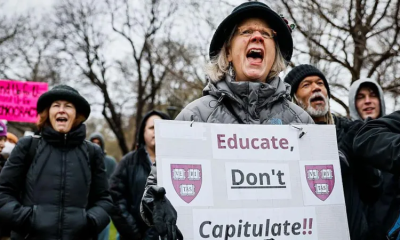
 Latest News7 days ago
Latest News7 days agoTrump freezes $2bn in Harvard funding after university rejects demands
-

 News5 days ago
News5 days agoCounsel for Pilleyan alleges govt. bid to force confession



